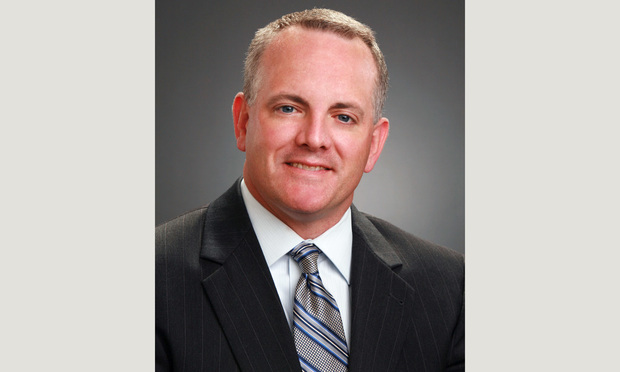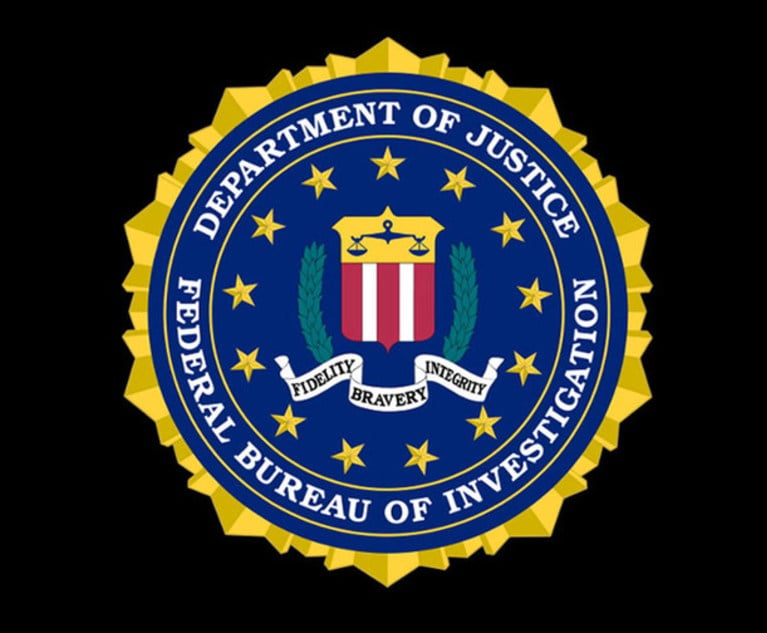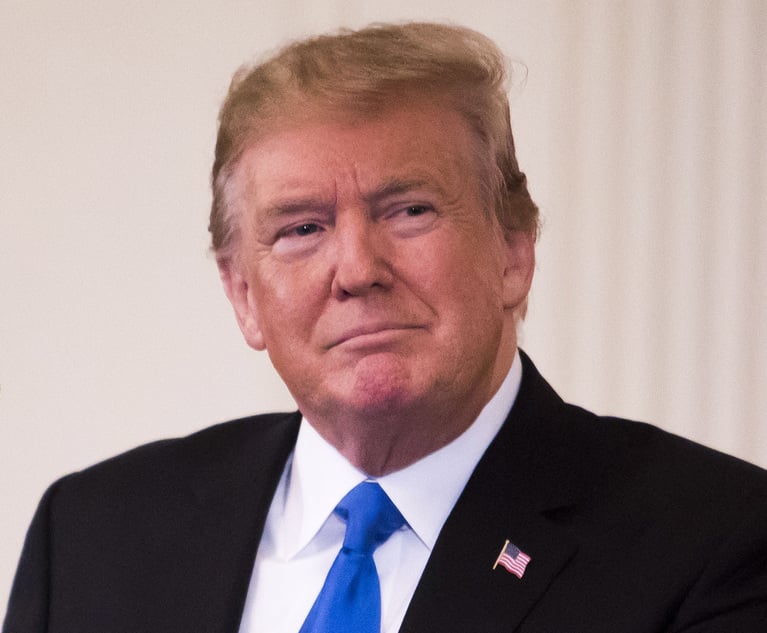Federal Judge in Newark Leads District of New Jersey in Outstanding Motions Pending
U.S. District Judge John Michael Vazquez has 44 motions pending six months or more in the federal judiciary's latest semiannual listing of those cases, which is far more than any other federal judge in the state.
December 26, 2019 at 02:35 PM
6 minute read
 U.S. District Judge John Michael Vazquez of the District of New Jersey. Courtesy photo
U.S. District Judge John Michael Vazquez of the District of New Jersey. Courtesy photo
One of the newest federal trial judges in New Jersey is far ahead of his peers in the number of undecided motions pending for six months or more.
U.S. District Judge John Michael Vazquez of the District of New Jersey has 44 motions pending six months or more in the federal judiciary's latest semiannual listing, which is mandated under the Civil Justice Reform Act of 1990. Vazquez, who was confirmed in January 2016, has led the state's federal judges in the number of motions pending six months or more for the last five reporting periods.
Vazquez had 44 motions outstanding in September 2018, 56 motions in March 2018, 55 in September 2017, and 18 in March 2017.
The latest report includes a description of the status of Vazquez's 44 cases with long-pending motions. Four are marked "hearing on motion necessary," three say "referred to magistrate judge," and 37 are marked "opinion/decision in draft."
Vazquez's 44 motions pending more than six months aren't especially egregious compared with other federal judges nationally. Six judges, two in New York and one each in California, Georgia, Texas and the U.S. Virgin Islands, had more than 100 motions pending in excess of six months. Another 11 judges around the country had between 50 and 100 outstanding motions.
Two judges on senior status are Vazquez's runners-up in the latest report of motions pending six months or more in New Jersey. Judge Joseph Rodriguez was second, with 18 motions pending, and Judge Katharine Hayden was third with 15 motions pending.
District Judge Esther Salas is fourth with 11 motions pending, followed by Judge Noel Hillman with seven.
Eleven judges listed in the latest report had no motions pending more than six months—Chief Judge Freda Wolfson and Judges Brian Martinotti, Anne Thompson, Robert Kugler, Renee Bumb, Susan Wigenton, Claire Cecchi, Kevin McNulty and Michael Shipp along with Jose Linares, who has returned to private practice, and the late Jerome Simandle. Judges William Martini and Madeline Cox Arleo each had two outstanding motions in the latest report, and Stanley Chesler, Peter Sheridan and the late William Walls had one each.
The latest CJRA report was released to the public Oct. 27 by the Administrative Office of the U.S. Courts. The report reflects civil caseloads as of March 31.
Vazquez did not respond to requests for comment on the backlog. Wolfson and Clerk of Court William Walsh also did not respond to requests for comment.
Vazquez and the rest of the state's District Court bench are laboring under a severe judge shortage, with six out of 17 seats currently vacant. President Donald Trump has yet to make any District Court nominations for New Jersey during his time in the White House.
As a result, New Jersey had 1,012 weighted filings per authorized judgeship in 2018, the second-highest of any judicial district in the nation. The Eastern District of Louisiana leads the nation with 1,219 weighted filings per judge. That compares with an average of 513 weighted filings per authorized judgeship for all district courts. Weighted filings per authorized judgeship is a yardstick the federal judiciary uses that accounts for both volume and complexity of each court's caseloads.
As for Vazquez's backlog, lawyers said the reasons could be complex. He could be saddled with "old dogs" sometimes transferred to new judges, or cases that linger on the docket because they are particularly hard to resolve, making veteran judges eager to unload them, said one longtime federal court practitioner speaking on condition of anonymity. That lawyer said he once had a federal case in New Jersey that was reassigned every time a new judge joined the court.
"Without knowing more about what's on his docket and the composition of his caseload, I wouldn't read anything into it," the lawyer said.
Carl Tobias, a law professor at the University of Richmond School of Law who studies the federal court system, said he wouldn't be surprised if some newly minted judges find themselves saddled with cases that other judges want to unload. When backlogs persist over time, it can indicate a problem but "caution is appropriate," he said.
Tobias said a judge who appears at the top of a list of backlogged cases might experience embarrassment, but he said the intention of the report is merely to have the data available publicly.
"I think collecting data is a good idea but publicizing it may or may not be," Tobias said. "I think the idea was that a chief judge who sees a pattern [of backlogs] might have a discussion with a particular judge and see if there is an issue. Sometimes, the judge might be sick. Sometimes the judge might have bad clerks. It's a delicate situation but I think the chief judges are pretty good at that sort of thing," he said.
Vazquez was confirmed by the Senate on Jan. 27, 2016. He was with the Roseland firm of Critchley, Kinum & Vazquez, where he handled patent infringement cases for drug companies and also represented criminal defendants.
Vazquez was an assistant U.S. attorney in the District of New Jersey from 2001 to 2006, working under then-U.S. Attorney Chris Christie as a coordinator of health fraud cases. In 2006, he was recruited by then-Attorney General Stuart Rabner, another veteran of the U.S. Attorney's Office, to serve as special assistant to the attorney general in charge of public corruption investigations. In that position, he also focused on securities fraud, Medicaid fraud and other economic crimes.
From 2007 to 2008, he served as first assistant attorney general for New Jersey, under Attorney General Anne Milgram. His duties included oversight of the Division of Criminal Justice, the Division of Law, the New Jersey State Police and the Division of Gaming Enforcement.
Vazquez received his law degree summa cum laude from Seton Hall University School of Law in 1996.
This content has been archived. It is available through our partners, LexisNexis® and Bloomberg Law.
To view this content, please continue to their sites.
Not a Lexis Subscriber?
Subscribe Now
Not a Bloomberg Law Subscriber?
Subscribe Now
NOT FOR REPRINT
© 2025 ALM Global, LLC, All Rights Reserved. Request academic re-use from www.copyright.com. All other uses, submit a request to [email protected]. For more information visit Asset & Logo Licensing.
You Might Like
View All
3rd Circuit Strikes Down NLRB’s Monetary Remedies for Fired Starbucks Workers


As Trafficking, Hate Crimes Rise in NJ, State's Federal Delegation Must Weigh in On New UN Proposal
4 minute read
Trending Stories
- 1'It's Not Going to Be Pretty': PayPal, Capital One Face Novel Class Actions Over 'Poaching' Commissions Owed Influencers
- 211th Circuit Rejects Trump's Emergency Request as DOJ Prepares to Release Special Counsel's Final Report
- 3Supreme Court Takes Up Challenge to ACA Task Force
- 4'Tragedy of Unspeakable Proportions:' Could Edison, DWP, Face Lawsuits Over LA Wildfires?
- 5Meta Pulls Plug on DEI Programs
Who Got The Work
Michael G. Bongiorno, Andrew Scott Dulberg and Elizabeth E. Driscoll from Wilmer Cutler Pickering Hale and Dorr have stepped in to represent Symbotic Inc., an A.I.-enabled technology platform that focuses on increasing supply chain efficiency, and other defendants in a pending shareholder derivative lawsuit. The case, filed Oct. 2 in Massachusetts District Court by the Brown Law Firm on behalf of Stephen Austen, accuses certain officers and directors of misleading investors in regard to Symbotic's potential for margin growth by failing to disclose that the company was not equipped to timely deploy its systems or manage expenses through project delays. The case, assigned to U.S. District Judge Nathaniel M. Gorton, is 1:24-cv-12522, Austen v. Cohen et al.
Who Got The Work
Edmund Polubinski and Marie Killmond of Davis Polk & Wardwell have entered appearances for data platform software development company MongoDB and other defendants in a pending shareholder derivative lawsuit. The action, filed Oct. 7 in New York Southern District Court by the Brown Law Firm, accuses the company's directors and/or officers of falsely expressing confidence in the company’s restructuring of its sales incentive plan and downplaying the severity of decreases in its upfront commitments. The case is 1:24-cv-07594, Roy v. Ittycheria et al.
Who Got The Work
Amy O. Bruchs and Kurt F. Ellison of Michael Best & Friedrich have entered appearances for Epic Systems Corp. in a pending employment discrimination lawsuit. The suit was filed Sept. 7 in Wisconsin Western District Court by Levine Eisberner LLC and Siri & Glimstad on behalf of a project manager who claims that he was wrongfully terminated after applying for a religious exemption to the defendant's COVID-19 vaccine mandate. The case, assigned to U.S. Magistrate Judge Anita Marie Boor, is 3:24-cv-00630, Secker, Nathan v. Epic Systems Corporation.
Who Got The Work
David X. Sullivan, Thomas J. Finn and Gregory A. Hall from McCarter & English have entered appearances for Sunrun Installation Services in a pending civil rights lawsuit. The complaint was filed Sept. 4 in Connecticut District Court by attorney Robert M. Berke on behalf of former employee George Edward Steins, who was arrested and charged with employing an unregistered home improvement salesperson. The complaint alleges that had Sunrun informed the Connecticut Department of Consumer Protection that the plaintiff's employment had ended in 2017 and that he no longer held Sunrun's home improvement contractor license, he would not have been hit with charges, which were dismissed in May 2024. The case, assigned to U.S. District Judge Jeffrey A. Meyer, is 3:24-cv-01423, Steins v. Sunrun, Inc. et al.
Who Got The Work
Greenberg Traurig shareholder Joshua L. Raskin has entered an appearance for boohoo.com UK Ltd. in a pending patent infringement lawsuit. The suit, filed Sept. 3 in Texas Eastern District Court by Rozier Hardt McDonough on behalf of Alto Dynamics, asserts five patents related to an online shopping platform. The case, assigned to U.S. District Judge Rodney Gilstrap, is 2:24-cv-00719, Alto Dynamics, LLC v. boohoo.com UK Limited.
Featured Firms
Law Offices of Gary Martin Hays & Associates, P.C.
(470) 294-1674
Law Offices of Mark E. Salomone
(857) 444-6468
Smith & Hassler
(713) 739-1250






